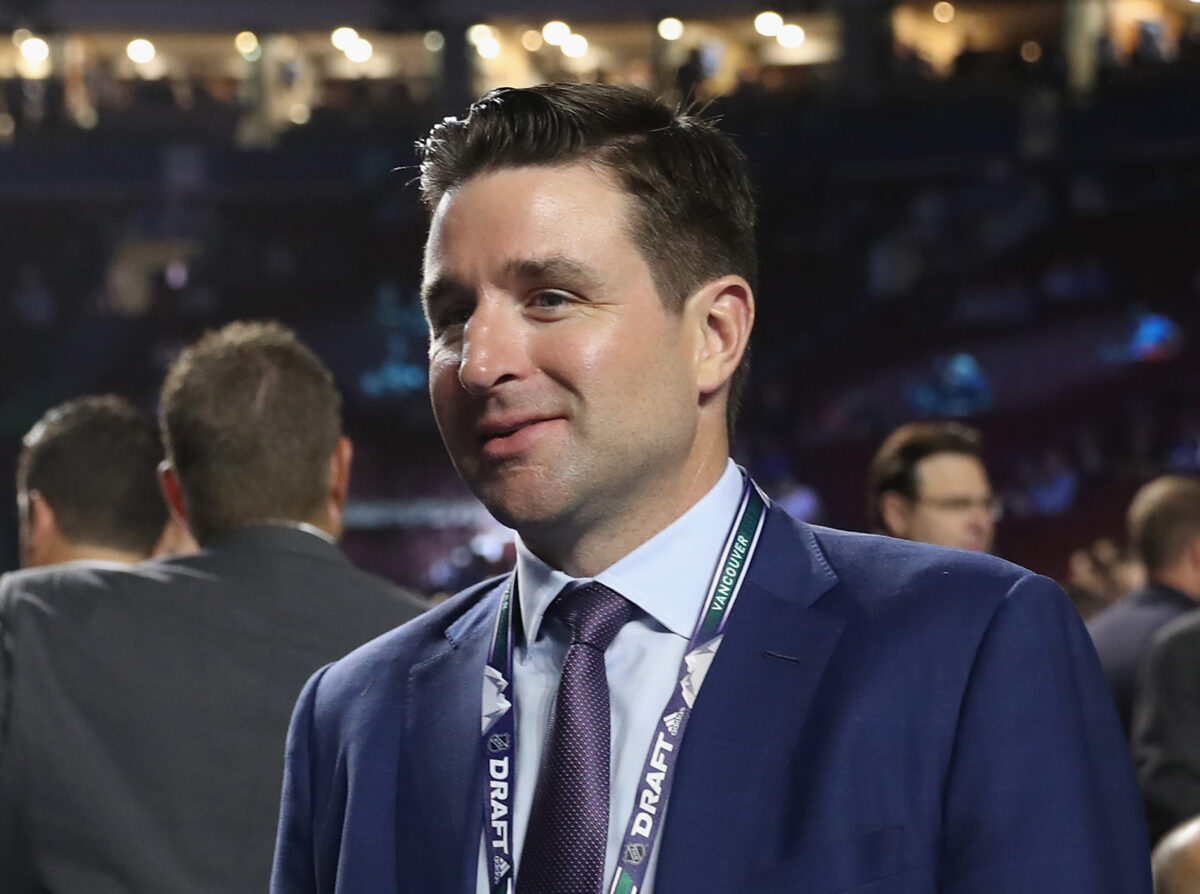In the end, the New York Rangers made young general manager Chris Drury’s trade-deadline approach easy.
Less than 12 hours after his team reached its high point of the season, emphatically declaring itself a contender by completing a daunting two-game weekend sweep of top Eastern Conference opponents, Drury moved the needle on his roster by pulling off three deals that remade the forward corps and added key veteran depth on defense.
Though it’s early in his front-office career, Drury profiles as a thoughtful, thorough executive, and his first trade deadline in charge only strengthened that image, as the GM waited until shortly before Monday’s 3 p.m. cutoff to make his moves. He acquired defenseman Justin Braun from the Philadelphia Flyers, center Tyler Motte from the Vancouver Canucks and forward Andrew Copp from the Winnipeg Jets, deals which cost the Rangers a handful of draft picks and young center Morgan Barron, but none of their top prospects.

In truth, though, Drury’s team had provided a big assist for him, conveniently rendering any remaining uncertainty over whether to add pieces at the deadline moot. Since the mid-February break, the Blueshirts were essentially auditioning for the front office, which watched closely to make sure that the team’s quantum leap from rebuilding project to apparent playoff contender this season was for real. With that being the situation, the weekend’s road back-to-back against the Tampa Bay Lightning and Carolina Hurricanes could not have come at a better time.
With a hard-fought, last-minute 2-1 victory over the two-time defending Stanley Cup champions Saturday and a hold-on-for-dear-life 2-0 win over the Hurricanes on Sunday, improving the club to 40-18-5, Drury knew he would have been derelict in his job had he not fortified his lineup. He showed no hesitation in doing so when the time was right, adding the versatile and dynamic Copp, who scores goals, plays with speed and can kill penalties, and the defensive-minded and disruptive Motte, who might move into a regular role in the middle of the fourth line.
“Excited with what we were able to do and get the players we were able to get, and excited to see them play hopefully as soon as (Tuesday),” Drury said.
Combined with Drury’s obtaining of speedy forward Frank Vatrano on Wednesday, the Rangers have addressed their season-long primary weak spot up front – a glaring lack of depth beyond star forwards Artemi Panarin, Chris Kreider, Mika Zibanejad and Ryan Strome.

Braun, a tough, competent defender, can play either side and might replace Patrik Nemeth on the third pair immediately, next to rookie Braden Schneider.
Drury’s Moves Didn’t Cost Too Much and Preserved Future Cap Space
What made the choice to go for it at the deadline a no-brainer was the Blueshirts again showing their GM that, despite possessing a somewhat substandard overall lineup (at least before the deadline), they are resilient and cohesive and believe they can win any game. In the face of Carolina’s Sunday onslaught – the ‘Canes held a 44-18 shot advantage – against a clearly tired opponent, the Rangers bent but did not break. They defended just well enough and allowed their one rested player, backup goaltender Alexandar Georgiev, to carry them to victory with the game of his career – and got an empty-net goal from Vatrano to seal the win.
If Drury didn’t think the 2021-22 edition of his team was different than other recent versions, he should have no doubt after the weekend. The Rangers didn’t profile as serious Stanley Cup contenders to start the season, but chances are that no one on their roster believes that now. The four key trades that yielded reinforcements for an all-but-certain postseason appearance should have the players convinced that Drury believes in them too.
Vatrano, Braun, Copp and Motte all qualify as rentals, with each becoming an unrestricted free agent after the season. Drury leveraged the Rangers’ copious deadline cap space – they had more than $30 million available – to add strong complements to their core of star forwards and top two blue-line pairings. At the same time, the GM was hardly reckless, avoiding the exorbitant trade prices paid by Eastern Conference opponents to get Hampus Lindholm (Boston Bruins), Ben Chiarot and Claude Giroux (Florida Panthers) and Brandon Hagel (Lightning).
Drury faces a major cap crunch starting next season and might need to dip into his still-intact pool of higher-end prospects to procure a second-line center if Ryan Strome leaves as a free agent. That aligns with his not taking on any financial commitment from these trades beyond this season.
He paid the most for Copp, giving up a pair of conditional second-round picks, one of which becomes a first if the Rangers win two playoff rounds and Copp plays in at least half the Rangers’ playoff games, along with Barron and a fifth-rounder while also receiving a sixth-round choice in the deal.
Built-Up Bottom Six Fixes a Season-Long Rangers Problem
That cost still seems worth it for Copp, who with 13 goals and 22 assists in 56 games was sought after at the deadline. He seems sure to become a pillar of a remade third line, which has been an offensive sinkhole all season.
“Versatility’s a great thing to have in your lineup. He’s certainly an exciting piece to have in a Rangers uniform,” Drury said.

In contrast, adding Vatrano, Motte and Braun only cost Drury a third-round pick and a pair of fourth-rounders. The suddenly longer Rangers lineup should give them a significantly better chance to compete in the playoffs against their formidable East foes, many of whom also made key moves before 3 p.m. Monday. The new Rangers, along with the eventual returns from injury by Kaapo Kakko and Kevin Rooney, should push Greg McKegg, Dryden Hunt and Julien Gauthier, miscast as regular forwards, into support roles for a strengthened group.
It all amounts to a smart, well-executed series of deadline deals for the 45-year-old who’s in charge of his hometown team – well, any team – for the first time. Thankfully for Drury, the Rangers at least made the question of whether or not to add players before the trade deadline a simple one.
